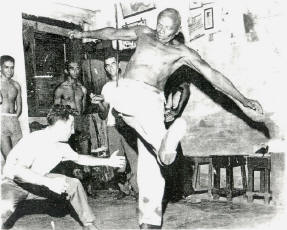
If this isn’t motivating, I don’t know what is! Image source
I’ve never liked trite phrases like “You can do anything you put your mind to!” – they somehow fail to motivate me. Yet over the past year, I’ve seen the truth of this statement lived out in a sort of case study with two of my students who started at the same point and are ending up at very different destinations.
Student #1 – Fulano
You may remember Fulano from the “I forget my glass” incident. Putting aside his occasional absentmindedness, he is one of my absolute best students!
One of the first things Fulano told me when we were discussing his English course was, “I’ve been taking English classes for years and years and I just can’t make any progress. I think I have some sort of mental block when it comes to English. Maybe I just don’t have the capacity for it.”
And Fulano really did have challenges. He struggled to understand spoken English, he had a really hard time putting words together, and his accent was so thick that the few words he did know came out practically unrecognizable. Learning a language does not come naturally to him.
But Fulano has poured himself into our classes 110%. Despite having a full-time job and a family, he has made time to take four classes a week AND study at home. Fulano is one of the few students I have who always does his homework – and if I don’t stop him, he’ll even work ahead.
Another little habit of Fulano’s which I love is that whenever I correct his pronunciation, he repeats the word to himself three or four times:
Fulano (reading aloud): Last year, she boget –
Me: Bought. It’s “buy” in the present and “bought” in the past.
Fulano: Bought, bought… “Bout” or “bought”?
Me: Bought.
Fulano: Boooouuught. Bought.
It’s like he’s trying out the flavor of the word in his mouth, attempting to train his mouth and facial muscles to get used to the new sounds.
And Fulano is making good progress! In our 6 months of class, he has passed two placement tests with very solid grades. His pronunciation is improving and he’s speaking in complete sentences. He’s becoming a grammar guru and he seldom needs to ask me to repeat things. Most importantly, although his English is still far from perfect, he can communicate.
Student #2 – Beltrano
I have another student who I’ll call “Beltrano.” Beltrano started out in much the same boat as Fulano – beginner-level with serious pronunciation challenges.
Beltrano takes group classes twice a week, so of course his progress wouldn’t be as fast as Fulano’s. But Beltrano has studied with me for over a year, and hasn’t made much progress at all. He has failed (and badly) two tests, and his speech still consists of a few roughly-pronounced words.
Why? Well, Beltrano’s level of effort leaves something to be desired. From the moment he walks into the classroom, he says “Olá” instead of “Hello.” He speaks Portuguese in class whenever possible and is often talking and joking with a classmate instead of paying attention. He’s developed the habit of asking a friend to translate my instructions and much of the written material. Whereas Fulano is a copious note-taker, Beltrano only writes something down if he notices that I’ve paused because everyone else in the class is taking notes. He often sighs and rolls his eyes when I give the class an activity to do. Whatever his reasons, he’s going through the motions of English study, but he doesn’t really invest himself in it.
The worth of willpower
Neither Fulano nor Beltrano enjoy the benefit of natural, innate language learning ability. But Fulano wants fluency – and he’s willing to put in the work to get there, even if it involves grunt work like pronouncing a word over and over or listening to a recording 20 times until he can understand it.
I’m trying to apply this to my own life at the moment. I have a goal, I’m building a business, and I have a vision of exactly what I want to achieve. Currently the process involves a lot of work with no apparent payoff. What’s worse is that I sometimes wonder if there’ll ever be a payoff, or if I’m pouring myself into something that just won’t work.
But every time I face the choice of working to move things forward or letting another day pass without doing so, I think of Fulano and I ask myself, “How badly do you want this?” – and that gives me the strength to go on.


